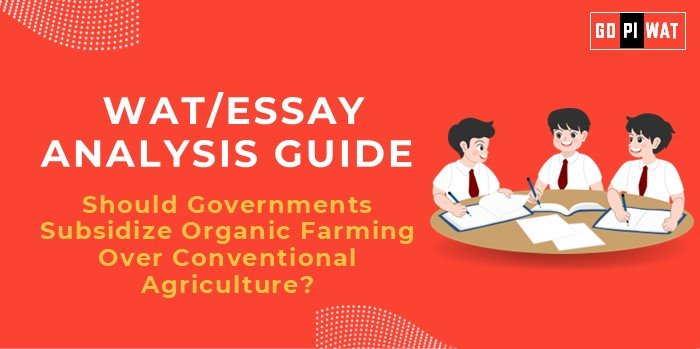📋 Written Ability Test (WAT)/Essay Analysis Guide
🌾 Should Governments Subsidize Organic Farming Over Conventional Agriculture?
🌟 Understanding the Topic’s Importance
The debate connects directly to sustainability, food security, and climate change—key themes for B-school curricula and global policy discourse.
📝 Effective Planning and Writing
- Time Allocation:
- Planning: 5 minutes
- Writing: 20 minutes
- Review: 5 minutes
📖 Introduction Techniques for Essays
- Contrast Approach: “While conventional farming feeds the majority, its environmental toll raises the need for organic alternatives.”
- Solution-Based Approach: “To combat climate change and ensure sustainable food systems, organic farming subsidies offer a viable pathway.”
📚 Structuring the Essay Body
- Achievements: Highlight Sikkim’s 100% organic success, reduced pesticide usage, and health benefits.
- Challenges: Discuss yield gaps, economic barriers, and certification hurdles.
- Future Outlook: Emphasize technology, hybrid farming practices, and policy consistency.
🔍 Concluding Effectively
- Balanced Template: “Government support for organic farming is essential for long-term sustainability, provided it is implemented alongside productivity measures.”
- Global Comparison Template: “Learning from Denmark’s successful subsidy models, countries can adopt scalable and sustainable farming practices.”
✍️ Sample Short Essays (100 words)
- Balanced Perspective: “Organic farming ensures environmental sustainability but faces productivity challenges. Subsidizing it can transform agriculture, but governments must address economic risks.”
- Solution-Oriented: “Subsidizing organic farming is a step toward climate resilience. Integrating technology and farmer training can resolve yield concerns.”
- Global Comparison: “Denmark’s organic success story demonstrates the power of subsidies. Governments worldwide should emulate such practices, tailoring them to local needs.”


